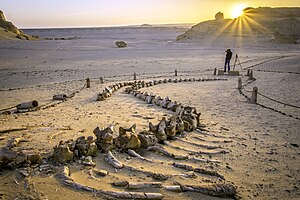Fayum is a city in Lower Egypt to the west of the Nile, 90 km (56 mi) from Cairo.
Understand
editFayum is a forgotten gem off Egypt beaten track. Archaeological evidence has found occupations around the Fayum dating back to at least the Epipalaeolithic. Middle Holocene occupations of the area are most widely studied on the north shore of Lake Moeris.
In ancient Egypt, the city was called Shedet, a centre of the cult of the crocodile god Sobek (Koinē Greek: Σοῦχος Soûkhos, Latin: Suchus). In consequence, the Greeks called it "Crocodile City" (Koinē Greek: Κροκοδειλόπολις Krokodeilópolis), Crocodīlopolis in Latin. The city worshipped a tamed sacred crocodile called in Koine Petsuchos, "the Son of Soukhos", adorned with gold and gem pendants. The Petsoukhos lived in a special temple pond and was fed by the priests with food provided by visitors. When Petsuchos died, it was replaced by another.
Under the Ptolemaic Kingdom, the city was for a while called Ptolemais Euergétis (Koinē Greek: Πτολεμαῒς Εὐεργέτις). Ptolemy II Philadelphus (309–246 BC) renamed the city Arsinoë and the whole nome after the name of his sister-wife Arsinoe II (316–270 or 268), who was deified after her death as part of the Ptolemaic cult of Alexander the Great, the official religion of the kingdom.
Under the Roman Empire, Arsinoë became part of the province of Arcadia Aegypti. To distinguish it from other cities of the same name, it was called "Arsinoë in Arcadia".
Get in
editBy microbus from different regions in Cairo e.g. Ramsis Square and also from different regions in Giza e.g. El-Remaya Square (Shotting Square) and El-Moneeb. There are slow trains from Cairo too.
- 1 Fayum railway station.
Get around
editSee
edit- 1 Sultan Qaitbay Mosque. Built by the wife of the eighteenth Sultan Qaitbey in the early 16th century. While not at all as impressive as other structures from the same period, it still showcases the historic importance of Fayum.
- 2 Medinet Madi Archaeological Park.
- 3 Karanis. An agricultural town in the Ptolemaic Kingdom, inhabited until the early 5th century. The dry conditions here are most suitable for the preservation of papyri, which makes Karanis very well known by archaeologists. The papyri collected here are now part of the University of Michigan Papyrus Collection.
- 4 Karanis Site Museum (متحف كوم أوشيم). Archaeological museum displaying ancient relics from Crocodilopolis and the Faiyum Oasis archaeological region
- Hanging Mosque.
- Waterwheels.
- 5 Lake Qaroun.
- 6 Temple of Qasr Qaroun. Su-Th 08:00-16:00, F-Sa 08:00-18:00.
- 7 al-Nazla (pottery village) (النزله), ☏ +20 84 277 0295.
- 8 Pyramid of Amenemhat III at Hawara, the last Pyramid in Egypt, Hawaret Al Maqtaa.
- 9 Seila Pyramid, As Saleheyah.
- 10 Lahun Barrage.
- 11 Monastery of the angel Gabriel Jebel Alngulwn (Deir angel Bo stage) (دير الملاك غبريال بجبل النقلون (دير الملاك بو خشبة)), ☏ +20 122 743 8519.
- North of Lake Qaroun:
- 12 Qasr Sagha Temple.
- 13 Greco-Roman city of Dimeh (near Qarun Lake).
- Petrified Forest
- Cannon Balls Valley
- 14 Wadi Rayan Protected Area. Waterfalls, round hills, springs area, lakes, bird watching.
Further out
edit- 15 Pottery Village of Tunis, ☏ +20 106 557 4833. 08:00-21:00 daily.
- 16 El Lahun pyramids (14 km southeast of the city, near the modern village of El Lahun). A pyramid associated with Senusret II, who ruled Egypt between 1897 BC and 1878 BC, during the Twelfth Dynasty.

- 17 Meidum Pyramid. Forgotten in the countryside more than 30 km northeast of Fayum, Meidum, a step pyramid, is one of the earliest pyramids ever built by the ancient Egyptians. The best way to get to this decidedly hard-to-reach site is perhaps to arrange a taxi in Fayum, or to look for the tours out of Cairo that combine a visit to Meidum with other off-the-beaten-path pyramid fields at Dahshur and Saqqara. No matter how you get there, you can be pretty sure that you will almost have all the site to yourself (along with few other lucky ones, at most).
- 18 Whale Valley or Wadi El Hitan is a
 UNESCO World Heritage Site with hundreds of fossils of some of the earliest forms of whale, the archaeoceti.
UNESCO World Heritage Site with hundreds of fossils of some of the earliest forms of whale, the archaeoceti.
Do
editBuy
edit- Local crafts of Fayoum
- Glazed Pottery (Tunis Village, South west of Lake Qaroun)
- Pottery (El Nazla village, Ibshaway)
- Carpets (Desya Village)
- Palm products (Al A'lam -Ka'aby)
- Patch work (Khalta village, South west of Lake Qaroun)
Eat
edit- You can find local food of Fayum in one of the Eco lodges in Tunis village and the restaurants in lake Qaroun.
- Fast food is also served in all the restaurants of Fayum city,
Drink
editSleep
edit
Hotels in Fayoum vary from 5 star hotels to Eco lodges.
Fayum city
edit- 1 Honey Day Hotel, Gamal Abd El-Nasir St, ☏ +20 84 6341205.
- Montazah hotel.
- 2 Helnan Auberge Fayoum (فندق هلنان اوبرج الفيوم), As Saeedeyah, Senoures, ☏ +20 84 2981200.
- 3 Panorama Shakshok hotel **** (بانوراما شكشوك), Shakshouk, Ibsheway, ☏ +20 109 024 4474.
- 4 Oasis Resort and Hotel (منتجع الواحة والفندق), Qaroun, Ibsheway, ☏ +20 84 6830900. has water slides.
- 5 Kamariat - El Mandara Lodge, Tunis Village, Lake Qaroun, ☏ +20 106 883 3083.
- Queen hotel.
- Pastrodos Hotel.
Tunis village
edit- 6 Zad Al-Mosafer (زاد المسافر), ☏ +20 100 236 7240.
- 7 Sobek Lodge, ☏ +20 106 888 5423. Pool and breakfast.
- 8 Zelal El Nakhil Fayoum (ظلال النخيل قرية تونس), Tunis Village, ☏ +20 122 287 7238.
Wadi Rayan Protected Area
edit- 9 Zowara Ecolodge (إيكولودج زوارة), ☏ +20 100 166 6979.
Go next
edit- Cairo is the must-see capital.
- Five oasis towns lie further out in the Western Desert.

